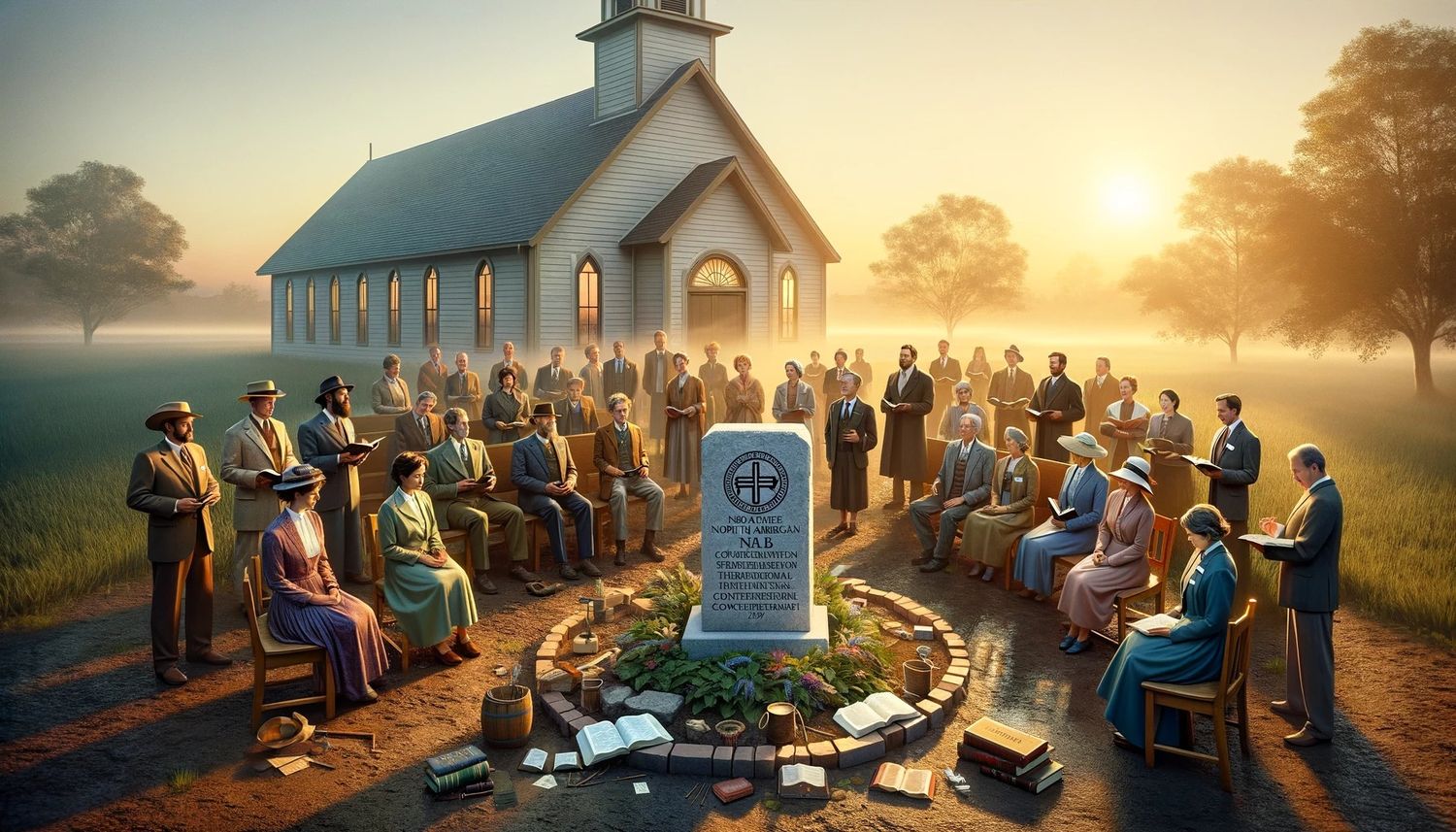Home>Theology and Spirituality>What Are The Lutheran Church Beliefs


Theology and Spirituality
What Are The Lutheran Church Beliefs
Published: March 3, 2024
Ericka Andersen, an editor at Christian.net, expertly merges digital strategy with content creation, focusing on faith and societal issues. Her communication skills enhance the platform's engaging narratives, fostering meaningful dialogue on belief's impact on society.
Discover the core beliefs of the Lutheran Church and its theology and spirituality. Explore the teachings and practices that shape Lutheran faith and community.
(Many of the links in this article redirect to a specific reviewed product. Your purchase of these products through affiliate links helps to generate commission for Christian.net, at no extra cost. Learn more)
Table of Contents
Introduction
What are the Lutheran Church beliefs? The Lutheran Church is a major branch of Protestant Christianity that traces its roots back to the teachings of Martin Luther in the 16th century. The beliefs of the Lutheran Church are based on Luther's theological writings and the principles of the Reformation. In this article, we will explore the core beliefs of the Lutheran Church, including its history, doctrines, and practices. Understanding the beliefs of the Lutheran Church is essential for gaining insight into the faith and practices of millions of adherents worldwide.
History of the Lutheran Church
-
Martin Luther and the Reformation: The Lutheran Church traces its origins to the 16th century when Martin Luther, a German monk and theologian, challenged the teachings and practices of the Roman Catholic Church. Luther's famous "95 Theses" sparked the Reformation, a movement that sought to reform the Catholic Church and restore the authority of the Bible in Christian faith and practice.
-
Formation of the Lutheran Church: As Luther's teachings gained popularity, a separate religious movement emerged, eventually leading to the formation of the Lutheran Church. The movement spread throughout Europe, particularly in German-speaking regions, and established its own distinct theological and liturgical traditions.
-
Spread of Lutheranism: Lutheranism continued to spread across Europe, finding adherents in Scandinavia, the Baltic states, and beyond. The Lutheran Church became a significant force in the Protestant Reformation, influencing the development of other Protestant denominations and shaping the religious landscape of the continent.
-
Diversity within Lutheranism: Over time, the Lutheran Church diversified into various branches and synods, each with its own distinct traditions and practices. This diversity reflects the global reach of Lutheranism and its ability to adapt to different cultural and social contexts.
-
Modern Lutheran Church: Today, the Lutheran Church is a global communion of churches, encompassing millions of members worldwide. It continues to uphold the teachings of Martin Luther while engaging with contemporary issues and challenges in the modern world.
Understanding the history of the Lutheran Church provides valuable insights into its theological development and its enduring impact on Christianity.
The Authority of Scripture
-
Sola Scriptura: The Lutheran Church upholds the principle of Sola Scriptura, which emphasizes the supreme authority of the Bible in matters of faith and doctrine. This doctrine asserts that the Bible is the ultimate source of divine revelation and the sole standard for Christian belief and practice. It is through the Scriptures that God's will and purpose for humanity are made known, and as such, the Bible holds a central place in Lutheran theology.
-
Inspiration and Inerrancy: Lutherans believe that the Scriptures are inspired by God and, therefore, free from error in their original form. They affirm the divine inspiration of both the Old and New Testaments, viewing them as the authoritative and trustworthy Word of God. This belief in the inerrancy of Scripture underpins the Lutheran Church's teachings and guides its understanding of God's will for humanity.
-
Interpretation and Tradition: While the Bible holds primary authority, the Lutheran Church also recognizes the role of tradition and interpretation in understanding Scripture. It acknowledges the importance of historical context, linguistic analysis, and theological reflection in interpreting the Bible, while affirming that the ultimate authority of Scripture remains unchallenged.
-
Teaching and Preaching: In Lutheran worship and teaching, the Scriptures take center stage. The reading and proclamation of the Bible hold a prominent place in liturgical practices, emphasizing the belief that God speaks to His people through the written Word. The authority of Scripture is upheld in the preaching of sermons, the administration of sacraments, and the formulation of doctrinal statements.
-
Application in Daily Life: The Lutheran Church encourages its members to engage with the Scriptures personally and to apply its teachings in their daily lives. The authority of Scripture extends beyond the confines of the church building, shaping the ethical, moral, and spiritual dimensions of believers' lives as they seek to live out their faith in the world.
Understanding the Lutheran Church's stance on the authority of Scripture provides valuable insights into its theological framework and its commitment to the foundational role of the Bible in shaping Christian belief and practice.
The Doctrine of Justification
-
Central Tenet: The doctrine of justification is a central tenet of Lutheran theology, emphasizing the belief that individuals are justified, or declared righteous, by God's grace through faith in Jesus Christ. This doctrine stands at the heart of the Lutheran understanding of salvation and serves as a defining feature of its theological identity.
-
Grace Alone: Lutherans affirm the principle of "sola gratia," meaning "grace alone." According to this doctrine, justification is not achieved through human effort or merit but is solely a result of God's unmerited favor and love for humanity. It is by God's grace that individuals are forgiven and reconciled to Him, apart from any works or achievements of their own.
-
Faith Alone: In line with the principle of "sola fide," or "faith alone," Lutherans teach that justification is received through faith in Jesus Christ. Faith is the means by which individuals appropriate the grace of God and receive the gift of salvation. It is not based on one's own righteousness or good deeds but is a response of trust in the promises of God.
-
Christ Alone: The Lutheran doctrine of justification also emphasizes the exclusive role of Christ in the process of salvation. It asserts that Jesus Christ, through His atoning sacrifice on the cross, has secured the redemption and justification of believers. It is through Christ's work that individuals are reconciled to God and granted the status of righteousness.
-
Imputation and Infusion: Lutherans distinguish between the concepts of imputed and infused righteousness. Imputed righteousness refers to the belief that Christ's righteousness is credited to believers, covering their sins and making them acceptable to God. Infused righteousness, on the other hand, involves the ongoing work of the Holy Spirit in believers' lives, progressively transforming them to live in accordance with God's will.
-
Assurance of Salvation: The doctrine of justification provides believers with the assurance of their salvation. By placing their trust in the finished work of Christ, individuals can have confidence in their standing before God and the certainty of their eternal destiny. This assurance is grounded in the unchanging faithfulness of God and the sufficiency of Christ's redemptive work.
Understanding the doctrine of justification is essential for grasping the theological framework of the Lutheran Church and its emphasis on the grace of God, the centrality of faith in Christ, and the assurance of salvation for believers.
The Sacraments
-
Sacramental Nature: The Lutheran Church recognizes two sacraments, namely Baptism and the Eucharist (Holy Communion), which are considered sacred and central to the life of the church. These sacraments are viewed as visible signs of God's invisible grace, conveying His presence and blessing to believers.
-
Baptism: In the Lutheran tradition, Baptism is regarded as a means of grace through which individuals are initiated into the Christian faith and the community of believers. It is administered using water and the Trinitarian formula, symbolizing the cleansing of sin, spiritual rebirth, and incorporation into the body of Christ. Lutherans believe that Baptism is a powerful act of God's saving work and a source of comfort and assurance for the baptized.
-
Eucharist (Holy Communion): The Eucharist holds a central place in Lutheran worship and theology. Lutherans affirm the real presence of Christ in the Eucharistic elements, emphasizing that, through the consecration of bread and wine, Christ's body and blood are truly and substantially present for the nourishment and spiritual sustenance of believers. The Eucharist is understood as a means of grace, strengthening the faith of participants and fostering unity within the body of Christ.
-
Sacramental Union: Lutherans uphold the doctrine of sacramental union, which teaches that, in the Eucharist, the true body and blood of Christ are present "in, with, and under" the bread and wine. This understanding emphasizes the spiritual reality of Christ's presence in the sacrament while acknowledging the continued existence of the bread and wine as visible elements of the Eucharist.
-
Frequency and Participation: The Lutheran Church encourages regular participation in the sacraments of Baptism and the Eucharist as essential components of the Christian life. Baptism is typically administered once, marking the beginning of one's journey of faith, while the Eucharist is celebrated frequently, often as part of the church's regular worship services.
-
Meaning and Significance: Both Baptism and the Eucharist hold profound significance in the life of the believer, serving as tangible expressions of God's grace and as sources of spiritual nourishment and renewal. These sacraments are seen as powerful means through which God communicates His love, forgiveness, and presence to His people.
Understanding the Lutheran Church's perspective on the sacraments provides valuable insights into its worship practices, theological convictions, and the spiritual significance attached to these sacred rites.
Read more: What Is The Lutheran Church
The Role of the Church
-
Proclamation of the Word: The Lutheran Church views the proclamation of the Word as a central aspect of its role. Through preaching, teaching, and the sharing of the Gospel, the church seeks to communicate God's message of salvation and hope to its members and the broader community. The Word of God is proclaimed as a source of guidance, comfort, and transformation, shaping the faith and life of believers.
-
Worship and Sacraments: The church plays a vital role in facilitating worship and the administration of the sacraments. It provides a sacred space for communal prayer, praise, and thanksgiving, allowing believers to express their devotion to God and to experience His presence in a corporate setting. Additionally, the church oversees the proper observance of Baptism and the Eucharist, ensuring that these sacraments are administered in accordance with the teachings of the Lutheran tradition.
-
Pastoral Care and Discipleship: As a spiritual community, the church is responsible for providing pastoral care and nurturing the growth of its members. This involves offering support, guidance, and counseling to individuals in times of need, as well as equipping them for a life of discipleship and service. The church serves as a place of spiritual formation, where believers are encouraged to deepen their faith and live out the principles of Christian discipleship.
-
Community Engagement and Mission: The Lutheran Church is committed to engaging with the wider community and participating in mission activities. It seeks to address social issues, promote justice, and extend compassion to those in need, reflecting the love and mercy of Christ in practical ways. Through outreach programs, charitable initiatives, and collaborative efforts, the church endeavors to be a positive influence in society and to share the message of God's love with others.
-
Fellowship and Unity: Another important role of the church is to foster fellowship and unity among believers. It provides a context for building relationships, mutual support, and a sense of belonging within the faith community. The church serves as a place where diverse individuals come together in worship and fellowship, transcending differences and experiencing the unity that comes from being part of the body of Christ.
-
Equipping and Empowering: The church is tasked with equipping and empowering its members for ministry and service. It encourages the development of spiritual gifts, talents, and leadership abilities, enabling individuals to contribute to the life and mission of the church. Through education, training, and mentorship, the church prepares believers to fulfill their calling and to make a meaningful impact in the world.
Understanding the multifaceted role of the church provides insight into its significance as a spiritual community and a catalyst for personal and collective transformation.
The Lutheran Church and Social Issues
-
Social Responsibility: The Lutheran Church places a strong emphasis on social responsibility and engagement with contemporary social issues. It views the pursuit of justice, compassion, and the alleviation of human suffering as integral to its mission. The church seeks to address societal challenges such as poverty, inequality, discrimination, and environmental stewardship, reflecting its commitment to upholding the dignity and well-being of all people.
-
Advocacy and Activism: Through its advocacy efforts, the Lutheran Church strives to be a voice for the marginalized and vulnerable in society. It advocates for policies and initiatives that promote human rights, equality, and the common good. The church engages in activism, speaking out against injustice and working towards systemic change that reflects the values of compassion, mercy, and solidarity.
-
Humanitarian Aid and Relief: The Lutheran Church is actively involved in providing humanitarian aid and relief to communities affected by natural disasters, conflicts, and other crises. It collaborates with international organizations and local partners to deliver emergency assistance, sustainable development programs, and long-term support for those in need. This commitment to humanitarian efforts reflects the church's dedication to serving the global community.
-
Ethical and Moral Guidance: In addressing social issues, the Lutheran Church offers ethical and moral guidance rooted in its theological principles. It provides a framework for ethical decision-making and encourages individuals to act with integrity, compassion, and a commitment to justice. The church's teachings on social ethics inform its stance on various contemporary issues, guiding its members in navigating complex moral dilemmas.
-
Dialogue and Reconciliation: The Lutheran Church promotes dialogue and reconciliation as essential components of addressing social issues. It seeks to foster understanding, empathy, and constructive engagement across diverse perspectives. Through interfaith dialogue, community partnerships, and reconciliation initiatives, the church endeavors to build bridges, promote healing, and work towards peaceful coexistence in a fractured world.
-
Community Empowerment: The Lutheran Church is dedicated to empowering communities to address their own social challenges. It supports grassroots initiatives, capacity-building programs, and community development projects that enable individuals and groups to advocate for their rights, access resources, and participate in shaping their own futures. This approach reflects the church's commitment to fostering self-reliance and agency within communities.
Understanding the Lutheran Church's engagement with social issues provides valuable insights into its commitment to promoting justice, compassion, and the well-being of individuals and communities, both locally and globally.
Conclusion
In conclusion, the beliefs of the Lutheran Church are deeply rooted in the historical legacy of the Protestant Reformation and the theological insights of Martin Luther. The Lutheran Church upholds the authority of Scripture, emphasizing the centrality of the Bible in shaping its faith and practices. Its doctrine of justification by grace through faith in Christ stands as a defining feature of its theological identity, offering believers the assurance of salvation and the promise of God's unmerited favor. The sacraments of Baptism and the Eucharist hold significant importance in the life of the church, serving as visible signs of God's grace and sources of spiritual nourishment. The role of the church encompasses proclamation, worship, pastoral care, community engagement, and equipping believers for ministry and service. Furthermore, the Lutheran Church is actively involved in addressing social issues, advocating for justice, providing humanitarian aid, and promoting ethical and moral guidance. Understanding the beliefs and practices of the Lutheran Church offers valuable insights into its rich theological heritage and its ongoing commitment to faith, compassion, and social responsibility.














